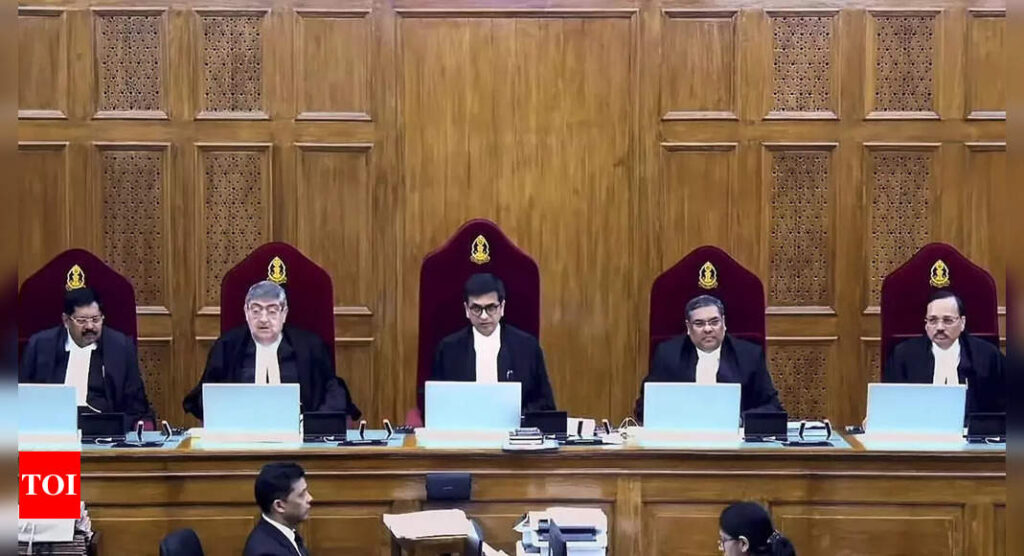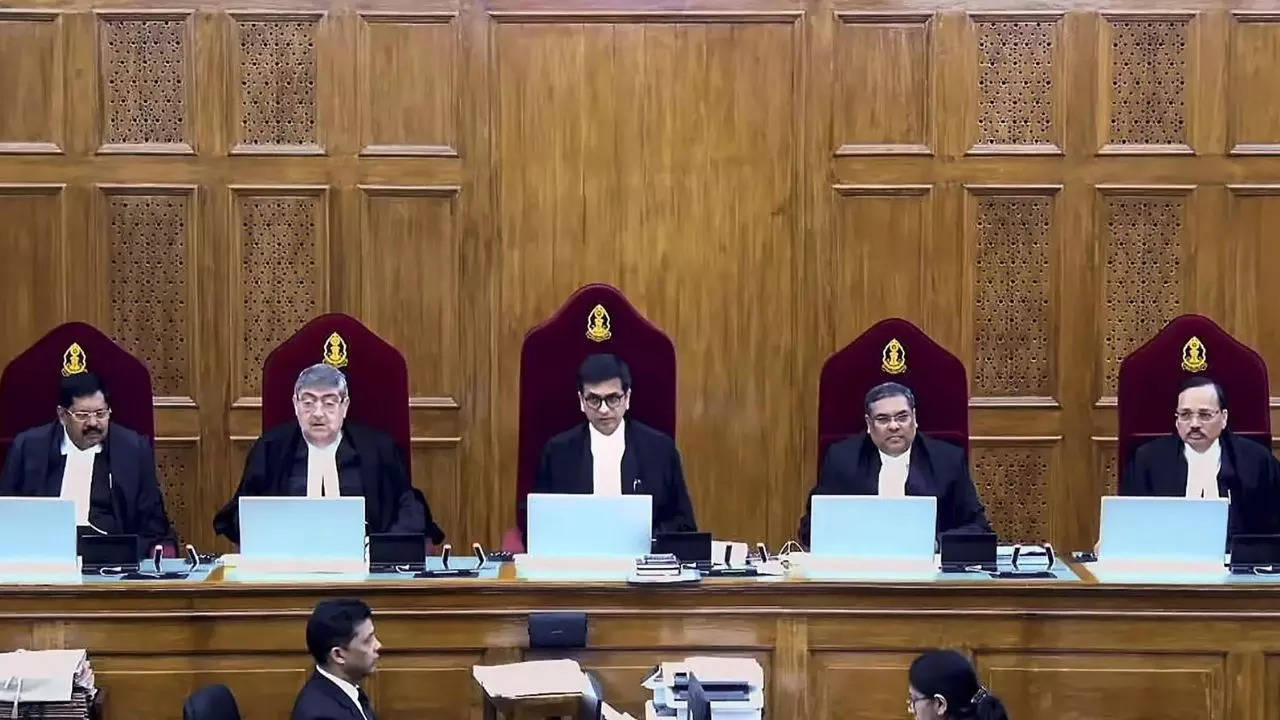[ad_1]
The Supreme Court on Monday upheld the Centre’s decision to abrogate Article 370 and said the decision was not characterized by “malafide” intent. Writing the judgment for himself and Justices Gavai and Surya Kant, Chief Justice of India D Y Chandrachud said Article 370 of the Constitution was a temporary provisionand the president has the power to revoke it.The bench also directed theElection Commission to conduct elections in Jammu and Kashmir by September 2024. The court also ordered authorities to take prompt measures to reinstate statehood in the region. Her are some key questions related to the verdict:
Q) Did Jammu & Kashmir retain an element of sovereignty when it joined the Union of India?
A) No, it did not. Because:
➤ On November 25, 1949, a Proclamation was issued for the state of Jammu & Kashmir by Yuvraj Karan Singh. The declaration in this Proclamation that the Constitution of India would not only supersede all other constitutional provisions in the state which were inconsistent with it but also abrogate them achieves what would have been attained by an agreement of merger.
➤ The Constitution of Jammu & Kashmir was only to further define the relationship between the Union of India and the State of Jammu & Kashmir. The relationship was already defined by the IoA, the Proclamation issued by Yuvraj Karan Singh in November 1949 and more importantly, by the Constitution of India.
➤ There is a clear absence in the Constitution of Jammu & Kashmir of a reference to sovereignty. In contrast, the Constitution of India emphasises in its Preamble that the people of India resolved to constitute India into a sovereign, socialistic, secular, democratic, republic.
Q) Is Article 370 a temporary provision?
A) The Supreme Court held that Article 370 is a temporary provision on a reading of the historical context in which it was included. The provision was introduced to serve two goals:
➤ First, the transitional purpose: to provide for an interim arrangement until the Constituent Assembly of the state was formed and took a decision on the legislative competence of the Union on matters other than the ones stipulated in the Instrument of Accession.
➤ Second, a temporary purpose: an interim arrangement in view of the special circumstances arising out of war conditions in the state.
➤ The SC said a textual reading of Article 370 also indicates that it is a temporary provision.
Q) What happens to the constitution of Jammu & Kashmir?
A) The gaps left by the non-application of some parts of the Constitution of India were filled by the Constitution of the state. After the abrogation of Article 370 and the application of the entirety of the Constitution of India to the state, the Constitution of the state does not fulfil any purpose. Hence, the implicit but necessary consequence of the application of the Constitution of India in its entirety to the state of Jammu & Kashmir is that state’s constitution becomes inoperative.
Q) Can Parliament convert a state into one or more Union Territories?
A) This the SC has left open.
➤ In an appropriate case, the SC said, it must construe the scope of powers under Article 3 in light of the necessary effect of converting a state to Union Territories, which is that autonomy would be diminished, the historical context for the creation of federating units, and its impact on the principles of federalism and representative democracy.
Q) What does the concurrent judgment by Justice S K Kaul say?
A) He highlighted the intergenerational trauma and suffering which the people in Jammu and Kashmir had to go through over the years and recommended the setting up of a truth and reconciliation commission to talk to the residents and probe into human rights violation by state and non-state actors since the 1980s.
Q) Did Jammu & Kashmir retain an element of sovereignty when it joined the Union of India?
A) No, it did not. Because:
➤ On November 25, 1949, a Proclamation was issued for the state of Jammu & Kashmir by Yuvraj Karan Singh. The declaration in this Proclamation that the Constitution of India would not only supersede all other constitutional provisions in the state which were inconsistent with it but also abrogate them achieves what would have been attained by an agreement of merger.
➤ The Constitution of Jammu & Kashmir was only to further define the relationship between the Union of India and the State of Jammu & Kashmir. The relationship was already defined by the IoA, the Proclamation issued by Yuvraj Karan Singh in November 1949 and more importantly, by the Constitution of India.
➤ There is a clear absence in the Constitution of Jammu & Kashmir of a reference to sovereignty. In contrast, the Constitution of India emphasises in its Preamble that the people of India resolved to constitute India into a sovereign, socialistic, secular, democratic, republic.
Q) Is Article 370 a temporary provision?
A) The Supreme Court held that Article 370 is a temporary provision on a reading of the historical context in which it was included. The provision was introduced to serve two goals:
➤ First, the transitional purpose: to provide for an interim arrangement until the Constituent Assembly of the state was formed and took a decision on the legislative competence of the Union on matters other than the ones stipulated in the Instrument of Accession.
➤ Second, a temporary purpose: an interim arrangement in view of the special circumstances arising out of war conditions in the state.
➤ The SC said a textual reading of Article 370 also indicates that it is a temporary provision.
Q) What happens to the constitution of Jammu & Kashmir?
A) The gaps left by the non-application of some parts of the Constitution of India were filled by the Constitution of the state. After the abrogation of Article 370 and the application of the entirety of the Constitution of India to the state, the Constitution of the state does not fulfil any purpose. Hence, the implicit but necessary consequence of the application of the Constitution of India in its entirety to the state of Jammu & Kashmir is that state’s constitution becomes inoperative.
Q) Can Parliament convert a state into one or more Union Territories?
A) This the SC has left open.
➤ In an appropriate case, the SC said, it must construe the scope of powers under Article 3 in light of the necessary effect of converting a state to Union Territories, which is that autonomy would be diminished, the historical context for the creation of federating units, and its impact on the principles of federalism and representative democracy.
Q) What does the concurrent judgment by Justice S K Kaul say?
A) He highlighted the intergenerational trauma and suffering which the people in Jammu and Kashmir had to go through over the years and recommended the setting up of a truth and reconciliation commission to talk to the residents and probe into human rights violation by state and non-state actors since the 1980s.
[ad_2]
Source link











More Stories
Congress replaces Kamal Nath, names an OBC as Madhya Pradesh chief | India News
Fire breaks out in ITBP camp in Srinagar; none hurt | India News
Parliament Security: Co-villagers give clean chit to Lalit Jha, parents to move court | India News